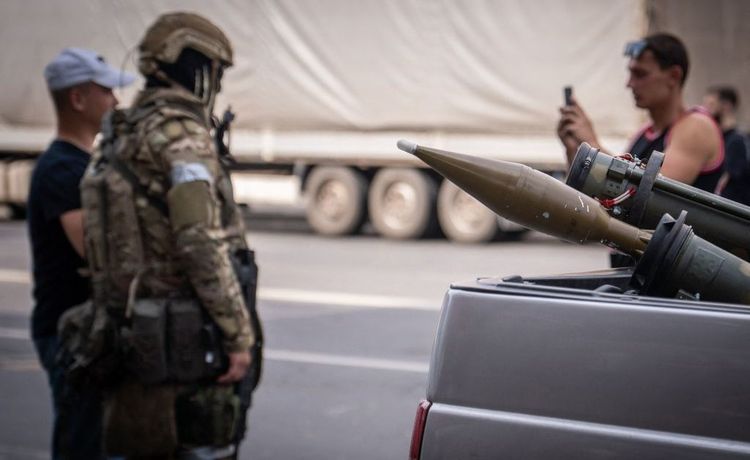Russian President Vladimir Putin organized troops on Saturday against what he called an armed rebellion led by Yevgeny Prigozhin, leader of the Wagner mercenary group, which claimed control of Rostov-on-Don, a city in southern Russia near the Ukrainian border, this weekend.
On Friday, Prigozhin originally demanded that several key military figures come speak with him, threatening to keep control of the city and take his troops to Moscow. However, in a turn of events later on Saturday, the convoy of Wagner vehicles traveling along a northbound highway halted just 120 miles away from Moscow.
Following the retreat, Neighboring Belarusian officials announced that the country’s President Alexander Lukashenko had negotiated a deal with Prigozhin to stop the advance and head to field camps in Ukraine with security guarantees, after discussions with Putin. Prigozhin said he decided to turn back to avoid “shedding Russian blood,” but did not mention whether the Kremlin met his demands.
On Friday, Prigozhin called for citizens to join Wagner’s campaign opposing Russia’s military leaders, claiming that Russian forces had attacked a Wagner camp in Ukraine—an allegation that Russia’s Ministry of Defense has denied. Prigozhin has long criticized the country’s military leadership over the long battles in Ukraine that have been plagued with supply shortages, but things came to a boiling point Saturday after taking over Rostov.
Putin initially vowed to quash the insurgency, calling it a rebellion and a “stab in the back.” He identified Prigozhin as a traitor and Russian authorities announced they are charging the mercenary leader with “organizing an armed rebellion.” Governments around the world have assembled emergency briefings to discuss the crisis. The U.K., U.S., European Union, and Canada have said they’re closely monitoring the situation.
Here’s what to know.
What led to the rebellion?Prigozhin has denied starting a military coup. He said his goal is simply, “a march for justice,” calling himself a patriot. Wagner hasn’t attempted to seize power from the government—the main hallmark of a coup—however, Prigozhin claims to have widespread support among the armed forces.
Originally a successful businessman before becoming a mercenary leader, Prigozhin was a close ally of Putin’s. Over the 16 months since Russia invaded Ukraine, Prigozhin’s criticisms against Russian military leadership have compounded.
The Wagner leader lost fighters in vast numbers during the bloody campaign to seize Bakhmut—a battle that Russia claimed full victory in, but that Ukraine refutes. Prigozhin has blamed the military for supply shortages and other leadership failures on social media, but avoided criticizing Putin directly. Prigozhin has emphasized that his issue is not with soldiers, but rather with military leadership.
A threat to PutinRussian authorities have declared a state of counterterrorism since Rostov was taken. Rostov is a major grain-producer in the region and home to a port for exporting grain. Wagner fighters are also said to have seized nearby military facilities in the city of Voronezh. Residents throughout the region have been advised not to travel and to stay in their homes.
Wagner’s forces are about 25,000 strong, and did not stand down after appeals from military generals Friday to resign their mission. Prigozhin claims that his forces were able to take over Rostov without firing a single shot. Wagner fighters will not turn themselves in, Prigozhin said. “We do not want the country to live on in corruption, deceit and bureaucracy.”
Prigozhin has considerable public support across Russia, and the country has come to rely on his mercenaries in the war. He’s maintained that his qualm doesn’t lie with the president’s leadership, however, Putin is taking the crisis seriously. The president delivered a five-minute-long broadcasted speech condemning Wagner’s actions.
“Everyone who deliberately embarked on the path of betrayal, who prepared an armed rebellion, chose the path of blackmail and terrorist methods—they will suffer inevitable punishment,” Putin said.
International ResponseSince the crisis began, Russia has continued strikes on Ukraine, firing over a dozen missiles at Kyiv. Ukrainians are welcoming the dispute as a distraction for Russia. Ukrainian President
Volodymr Zelensky called Russia’s weakness obvious, referring to the chaos with Wagner. U.S. government officials announced they’re watching the situation closely and the U.K. described it as the “most significant challenge to the Russian state” as of late.
President Joe Biden spoke with French President Emmanuel Macron, German Chancellor Olaf Scholz, and British Prime Minister Rishi about the rebellion on Saturday, according to the White House. The leaders also affirmed their ongoing support for Ukraine in the war. Russian officials warned Western countries not to use the crisis as an opportunity “to achieve their Russophobic goals.”
On Saturday, prior to the Wagner halt, Turkish President Recep Tayyip Erdogan said he offered Putin Turkey’s help seeking a “peaceful resolution.” Iranian officials announced that they recognized Russian rule of law and that the events in Russia were an internal matter.
Just west of Russia, Latvia moved to tighten border security after the conflict broke out. The foreign minister also announced that Latvia would cease admitting Russians into the country altogether. Several countries, including the Czech Republic, Israel, and Estonia urged their citizens to reconsider travel to Russia.
Contact us at [email protected].









































